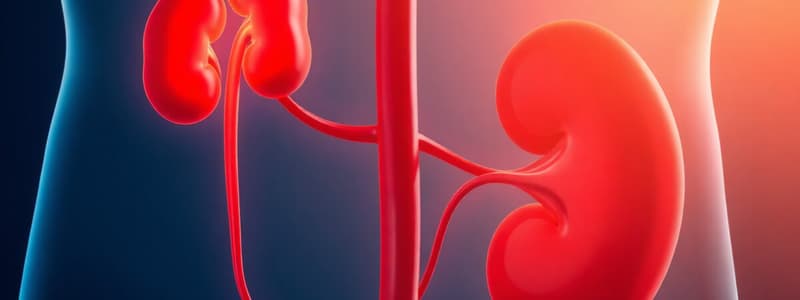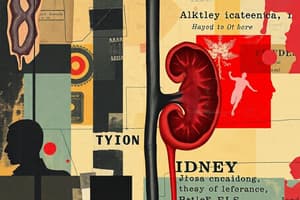Podcast
Questions and Answers
What defines anuria?
What defines anuria?
- Complete absence of urine production (correct)
- Increased urine production
- Production of less than 300 ml of urine per day
- Excretion of normal urine volume
Which of the following is a prerenal cause of acute renal failure?
Which of the following is a prerenal cause of acute renal failure?
- Hypovolaemia (correct)
- Angiotensin-converting enzyme inhibitors
- Contrast media
- Myoglobinuria
Which conditions can lead to oliguria?
Which conditions can lead to oliguria?
- Excreting more than 300 ml of urine per day
- Dehydration and excessive sweating (correct)
- Sepsis from any cause
- Chronic renal failure
What role does hypoxia play in renal function?
What role does hypoxia play in renal function?
Which of the following substances is known to be nephrotoxic?
Which of the following substances is known to be nephrotoxic?
What is a common obstructive cause of acute renal failure?
What is a common obstructive cause of acute renal failure?
What condition is associated with myoglobinuria?
What condition is associated with myoglobinuria?
What is a likely consequence of incompatible blood transfusion?
What is a likely consequence of incompatible blood transfusion?
Which of the following is a renal cause of acute renal failure?
Which of the following is a renal cause of acute renal failure?
What is a likely cause of unilateral renal colic?
What is a likely cause of unilateral renal colic?
Which condition can lead to obstruction of the ureters?
Which condition can lead to obstruction of the ureters?
What can cause crystalluria in patients receiving chemotherapy?
What can cause crystalluria in patients receiving chemotherapy?
Which sign may indicate a prerenal cause of reduced urine output?
Which sign may indicate a prerenal cause of reduced urine output?
What imaging technique can show ureteric dilatation in suspected obstruction?
What imaging technique can show ureteric dilatation in suspected obstruction?
Which characteristic is NOT associated with progressing to chronic renal failure?
Which characteristic is NOT associated with progressing to chronic renal failure?
What is the first phase in the progression of renal failure caused by acute tubular necrosis?
What is the first phase in the progression of renal failure caused by acute tubular necrosis?
What should be assessed to rule out prerenal causes of reduced urine output?
What should be assessed to rule out prerenal causes of reduced urine output?
Which drug class is associated with the cause of crystalluria?
Which drug class is associated with the cause of crystalluria?
Which factor is essential to check when a voided urine sample cannot be obtained?
Which factor is essential to check when a voided urine sample cannot be obtained?
What is the primary purpose of a percutaneous nephrostomy?
What is the primary purpose of a percutaneous nephrostomy?
What imaging technique is used to guide the insertion of a J-stent?
What imaging technique is used to guide the insertion of a J-stent?
Which step involves the use of a guide wire during the J-stent insertion procedure?
Which step involves the use of a guide wire during the J-stent insertion procedure?
What is a potential complication of having a J-stent in place?
What is a potential complication of having a J-stent in place?
Why is open surgery for nephrostomy considered rare?
Why is open surgery for nephrostomy considered rare?
What is the purpose of curling the ends of the J-stent to form a J-shape?
What is the purpose of curling the ends of the J-stent to form a J-shape?
What is the initial management aimed at restoring in patients with hypovolaemia or sepsis?
What is the initial management aimed at restoring in patients with hypovolaemia or sepsis?
What medication may improve cardiac efficiency in patients with hypovolaemia?
What medication may improve cardiac efficiency in patients with hypovolaemia?
When urine production is not restored, what medication can be given, albeit with nephrotoxicity concerns?
When urine production is not restored, what medication can be given, albeit with nephrotoxicity concerns?
What is the aim for central venous pressure in management?
What is the aim for central venous pressure in management?
What characterizes the oliguric phase of renal failure?
What characterizes the oliguric phase of renal failure?
Why is careful monitoring and management of fluid and electrolyte requirements necessary during the diuretic phase?
Why is careful monitoring and management of fluid and electrolyte requirements necessary during the diuretic phase?
What treatment may become necessary if rising serum potassium levels are detected?
What treatment may become necessary if rising serum potassium levels are detected?
What is a potential adverse effect of using mannitol in patients?
What is a potential adverse effect of using mannitol in patients?
What phase of acute kidney injury may last up to 6 weeks?
What phase of acute kidney injury may last up to 6 weeks?
What should be administered with extreme care to avoid circulatory overload when oral or enteral feeding is not possible?
What should be administered with extreme care to avoid circulatory overload when oral or enteral feeding is not possible?
What is a key aspect of general nursing care for seriously ill or comatose patients?
What is a key aspect of general nursing care for seriously ill or comatose patients?
Which therapy is specifically indicated for patients experiencing significant uraemic symptoms?
Which therapy is specifically indicated for patients experiencing significant uraemic symptoms?
What is a potential disadvantage of acute peritoneal dialysis?
What is a potential disadvantage of acute peritoneal dialysis?
What technique is used to keep lines patent between sessions of haemodialysis?
What technique is used to keep lines patent between sessions of haemodialysis?
What treatment is recommended for obstructive renal failure when surgery is too risky?
What treatment is recommended for obstructive renal failure when surgery is too risky?
How does haemofiltration compare to haemodialysis?
How does haemofiltration compare to haemodialysis?
What method is used for fluid drainage in acute peritoneal dialysis?
What method is used for fluid drainage in acute peritoneal dialysis?
Which of the following patients would require non-nephrotoxic antibiotics?
Which of the following patients would require non-nephrotoxic antibiotics?
What is a common nursing measure to prevent pressure sores in immobile patients?
What is a common nursing measure to prevent pressure sores in immobile patients?
What complication might occur with uncontrolled hyperkalaemia?
What complication might occur with uncontrolled hyperkalaemia?
Flashcards are hidden until you start studying
Study Notes
Anuria and Oliguria
- Anuria refers to the complete absence of urine production.
- Oliguria occurs when urine output is less than 300 ml per day.
Renal Blood Flow
- Kidney function and urine production hinge on oxygenated blood perfusion.
- Reduced renal blood flow or hypoxia can impair kidney function.
Types of Renal Failure
- Renal failure is classified into three categories:
- Prerenal: Caused by factors affecting blood flow to the kidneys.
- Renal: Caused by damage to the kidney itself.
- Postrenal: Resulting from obstruction in the urinary tract.
Prerenal Causes
- Hypovolemia: Inadequate fluid intake or excessive water loss from dehydration, vomiting, diarrhea, burns, or sweating.
- Blood loss: Acute loss often due to trauma or surgery.
- Sepsis: Gram-negative septicemia can lead to shock and renal impairment, particularly in immunocompromised individuals.
- Cardiogenic shock: Can result from myocardial infarction-related dysarhythmia or pulmonary embolus, reducing cardiac output.
- Anesthesia: Hypotension can occur following epidural or spinal anesthesia.
- Hypoxia: Prolonged hypoxia from various causes may occasionally lead to renal impairment.
Renal Causes
- Nephrotoxic Drugs: Aminoglycosides, cephalosporins, diuretics, NSAIDs, and ACE inhibitors may lead to renal failure.
- Poisons: Certain toxins can harm renal function.
- Contrast Media: Can induce renal failure in dehydrated patients with pre-existing issues.
- Eclampsia: Early pre-eclampsia recognition prevents nephrotoxic effects.
- Myoglobinuria: Associated with crush syndrome post-trauma.
- Incompatible Blood Transfusion: May result in renal failure.
- Disseminated Intravascular Coagulation (DIC): Often follows major sepsis or blood transfusions.
Postrenal Causes
- Calculi: Common cause of acute obstruction leading to anuria; may accompany renal colic.
- Pelvic Malignancy: Tumors from bladder, prostate, cervix, ovary, or rectum may obstruct ureters.
- Surgery: Ureters may be accidentally damaged during pelvic surgeries.
- Retroperitoneal Fibrosis: May lead to ureteric obstruction.
- Bilharzia: Schistosomiasis can cause ureteric fibrosis and potentially lead to bladder cancer.
- Crystalluria: Rarely associated with sulphonamide medications; can occur in chemotherapy patients.
Clinical Assessment
- Determine if urine is produced through catheterization if necessary; assess urine specific gravity and appearance for casts or myoglobinuria.
- Identify potential prerenal causes through clinical examination and vital signs assessment.
- Check for ureteric obstruction via ultrasonography; plain abdominal radiographs for calculi.
- Review recent drug administration for potential nephrotoxic agents.
- Evaluate for chronic renal failure progression via ultrasound and clinical signs.
Management and Treatment Phases
- Acute tubular necrosis progresses through:
- Oliguria Phase: Initial management focuses on restoring circulating volume and correcting tissue hypoxia.
- Diuretic Phase: Typically occurs from the 8th to 10th day; glomerular filtration resumes first.
- Recovery Phase: Not all patients will fully recover; some may require renal replacement therapy.
Supportive Care
- Nutritional Support: Administer parenteral nutrition cautiously to avoid overload.
- Infection Prevention: Increased infection risk necessitates routine cultures and use of non-nephrotoxic antibiotics.
- Fluid Balance Monitoring: Essential for patients; meticulous recording is crucial, especially for seriously ill patients.
Renal Replacement Therapies
- Peritoneal Dialysis: Performed if no recent abdominal surgery; involves using the peritoneum for dialysis.
- Hemodialysis: Life-saving if performed through a catheter placed in a large vein, but may cause fluid balance fluctuations.
- Hemofiltration: Similar to hemodialysis but with less cardiovascular instability.
- Obstructive Renal Failure Management: May require drainage via nephrostomy or stent placement if surgical intervention is not viable.
Surgical Interventions
- Percutaneous Nephrostomy: Involves catheter insertion for urinary drainage under ultrasound guidance.
- J-Stent Insertion: A procedure to drain urine into the bladder using fluoroscopic guidance.
- Open Surgery: Rare in the presence of advanced minimally invasive techniques.
Studying That Suits You
Use AI to generate personalized quizzes and flashcards to suit your learning preferences.




